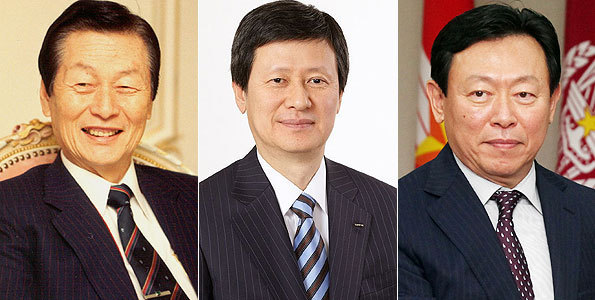by ALEX HYUN | @ahyundarkb4dawn
editor@charactermedia.com
Two brothers squabble for control of their family’s multimillion corporation while staging coups and firing accusations at each other. No, this isn’t the synopsis for the next big Korean drama. This is the current state of South Korea’s fifth largest conglomerate, Lotte.
Last month, Lotte’s founder and his two prospective heirs became embroiled in a complicated succession battle, which has reignited public antipathy towards chaebols, or family-run conglomerates. Here’s a breakdown of the ongoing Lotte feud.
What is Lotte?

Founded in 1948 in Tokyo by Shin Kyuk-ho, the Lotte Group started off as a chewing gum distributor to children in post-war Japan. Nearly a decade later, Shin expanded the company to South Korea and became the country’s largest confectionary manufacturer.
Lotte group engages in several industries, such as shopping, entertainment, finance, hotels, and food. There are currently 199 locations for its supermarket chain, Lotte Mart, and 34 locations for its Lotte Department Store. The company’s theme park, Lotte World, is one of the largest indoor theme parks in the world, and the construction of Lotte Super Tower 123 is scheduled to become the tallest building on the Korean peninsula.
Lotte’s sales in Korea last year generated nearly $70 billion.
The Feud
 (Image via ST Graphics)
(Image via ST Graphics)
The feud began on July 27 when the 92-year-old Shin dismissed his younger son Shin Dong-bin, the chairman of Lotte Group, along with six board directors. According to the Korea Herald, Lotte Group lost billions of dollars from its operations in China over the past four years, and Dong-bin had reportedly failed to report the losses to his father.
A day after his dismissal, Dong-bin held an emergency board meeting and staged a coup to remove his father as general chairman of the company’s holdings. As a result, the younger son kept both of his executive titles.
The move angered Shin Dong-joo, the oldest son and former CEO of Lotte Group Japan, who called his father’s demotion unlawful. In January 2015, Dong-joo himself was fired after his father discovered that he had overstepped his role by meddling in the management of Korean operations. During his older brother’s absence, Dong-bin was promoted to head Tokyo-based Lotte Holdings, gaining control of both Lotte groups in Japan and Korea.
To win back his father’s support, Dong-joo reportedly flew to Seoul and sought forgiveness. However, the tables have turned after Shin was ousted from his position.
On July 29, Dong-joo presented a letter purportedly signed by his father that proclaimed him as the heir to the company’s holdings, according to CNBC. However, Dong-bin denounced the document, arguing that it is “not legally binding” and that Shin could have written it under duress.
Recently, Dong-bin made a public apology for the chaos that has befallen the company and assured the public that the issue will be resolved. Meanwhile, Shin has called Dong-bin’s actions “unforgivable” and the family feud a “pitiable situation.” The founder added that he never appointed his second son as the heir of Lotte Group.
Is Lotte Korean or Japanese?

(Image via Wikimedia Commons/Public Domain)
The feud has also sparked a debate over whether Lotte is a Japanese or Korean company. Although Lotte was founded in Tokyo, the company’s operations in Korea are 15 times bigger than those in Japan.
Born and raised in Japan by their Japanese mother, Dong-joo and Dong-bin speak very little Korean, according to Asia One. After KBS aired an interview with Dong-joo and his father speaking in Japanese, Korean viewers have criticized the Shin family for their lack of Korean-speaking abilities and voiced their confusion on Lotte’s corporate identity. In a bid to win public opinion, Dong-bin has apologized and released statements in Korean.
“Lotte is a Korean company,” he said in Korean at a news conference last week. “About 95 percent of the total sales are generated in Korea.”
Still, Japan’s media and public consider Lotte as a Japanese company. Many Koreans are beginning to adopt this viewpoint as well, especially after the media reported that Japanese firms own 99 percent of Seoul-based Lotte Hotel Co.’s shares.
Other chaebol feuds and scandals

Chaebols have been widely criticized for their economic dominance as well as their lack of business ethics and transparency. As these conglomerates prepare to transition ownership to a third-generation, there is growing public concern about corporate heirs not being qualified to effectively run their companies.
Lotte’s recent feud is making headlines, but it’s not the first of its kind.
Hyundai is the first company that comes to mind when discussing issues with the chaebol system. Founded in 1946 by Chung Ju-yung, Hyundai’s rise to success is marred by the untimely deaths of Chung’s sons and a power struggle within the family that continues today.
SK Group, South Korea’s largest wireless mobile phone service provider, has also seen its fair share of scandal. The current chairman of the company, Chey Tae-won, commands the company from prison after he was convicted of embezzling nearly 50 billion won, according to the Straits Times. His younger brother, Chey Jae-won, is also serving prison time for collusion charges.
See Also: South Korean Court Frees ‘Nut Rage’ Executive Heather Cho
While feuds and scandals are nothing new to chaebols, the Lotte succession feud particularly stands out because it’s very rare to see a son oust his father from a company he founded.
What is the future of Lotte?
 (Photo via Bloomberg)
(Photo via Bloomberg)
It is difficult to say what the future holds for these family-run conglomerates. With Lotte’s recent power struggle, investors both domestic and foreign may take more considerations before investing in South Korean companies.
Lotte’s future is a waiting game at this point in time. A shareholder meeting is expected on Aug.17 to discuss the future for the brothers involved in the recent power struggle, according to Yonhap News Agency. Still, some have called for the government to step in.
“If Lotte can’t do it, the government and the National Parliament should execute an all-out reform of cheabol,” said the Citizens’ Coalition for Economic Justice.
Fortunately for some, reform may be on the way. Business Korea reported on Friday the South Korean government, the Saenuri Party, and the Fair Trade Commission met on Aug.6 to deliberate over possible reforms for chaebols including Lotte.
See Also
Daum Kakao Appoints South Korea’s Youngest CEO
___
Featured image via Yonhap







